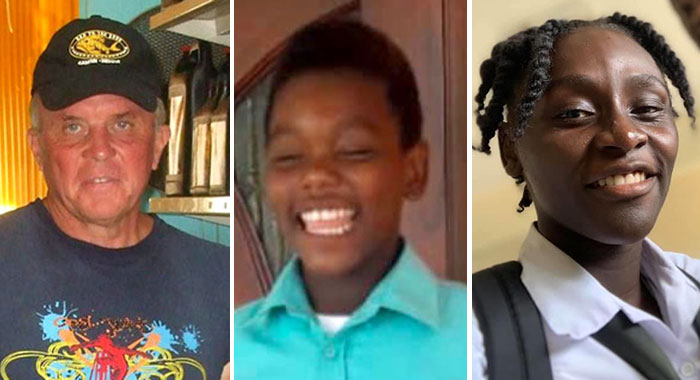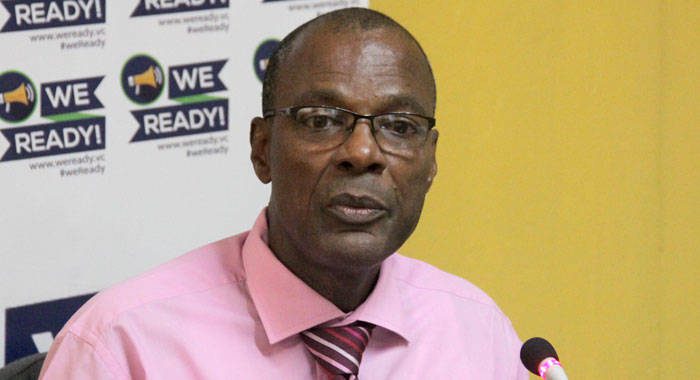The initial response to the three burn victims after last week Tuesday’s gas station explosion in Union Island, shows that St. Vincent and the Grenadines, in many respects, is “far from ready”.
“When you see the way these burn victims were handled in the very first instances, it tells of … lack of training, lack of understanding of our first responders,” said Member of Parliament for West Kingstown and opposition shadow minister for health, Daniel Cummings.
Cummings, speaking Tuesday on New Times, his New Democratic Party’s daytime radio programme, said that the hospital in Union Island is rudimentary and lacks a number of things.
“But, on the ground, the firefighting capability, the first aid capability clearly shows up extremely lacking,” he said on the programme on which Member of Parliament for the Southern Grenadines, Terrance Ollivierre, who is also an opposition lawmaker, was a guest.
Two of the three burn victims — 14-year-old student Lindani Neverson as well as Freddy Naert, 72, the owner of the gas station — died on Sunday, May 24, at the Milton Cato Memorial Hospital in Kingstown, where they were taken Tuesday night.
Neart sustained first degree burns about his body while Neverson had second-degree burns.
Meanwhile, Graniqua “Azara” Alexander, 17, who suffered second and third degree burns as a result of the explosion, was flown to Trinidad for medical attention Sunday night.
She died Wednesday night.
The explosion occurred about 6:40 p.m. and the coast guard vessel that transported Alexander — a rigid hull inflatable boat — set off from Union Island around 9 p.m.
The larger vessel, Capt. Hugh Mulzac, which transported the two male victims, left sometime around midnight, about an hour after the patients had been loaded unto the vessel, and arrived sometime around 3 a.m. sources tell iWitness News.
Cummings noted that a gas station explosion is not an everyday occurrence and the response requires a level of expertise from the very beginning if they outcome is not to be as tragic as it has been in this case.
“The length of time that it took for the injured to be brought to mainland St. Vincent is just too much, far too much,” he said.
“During that period, precious little was done. I am not clear that even the Coast Guard people understood what could have been done in circumstances of that kind. And the length of time to move from the ship and the hospital and whether there was preparation in the hospital,” he said.

Cummings said:
“A response mechanism has to be in place that automatically triggers a series of events. When the Coast Guard lands at the dock, the ambulance with the supporting services and the treatment personnel should be on the spot so that no time is wasted between reaching the land and reaching the hospital. The hospital should have been fully aware and have systems in place and so on and so forth.”
The MP said one does not have to be a health expert to understand the significance of timely intervention in such circumstances.
“Because you are dealing here primarily with the loss of fluids, quiet apart from the obvious pain and suffering that these people would have been going through at the time of the incident.”
He said the incident highlights a need to put in place a mechanism to have trained first responders throughout the multi-island nation.
“These don’t have to be high-level medical experts but there are certain basic training that you can give to people that can certainly help to save lives. How you can prevent the situation from getting worse? What interventions can be done even as you try to save lives and transport the persons?”
Cummings said that from footage he has seen, there was “nothing but chaos and confusion” in moving the injured persons first to the Union Island hospital and then to the Coast Guard vessel.
“We are far from ready, very far from ready,” he said.
“Once you have a report of a fire at a gas station and people burnt, the Coast Guard is coming down to pick them up, the Coast Guard shouldn’t come with Coast Guard [officers] alone.
“Coast Guard people should have basic training, yes, but the health people from the hospital should be on that Coast Guard boat because you know the health people in Union island are limited, not only in their training, but in terms of supplies.
“So those things should be carried down on the coast guard then stabilise the patient and get them out as quickly as possible. That is part of a healthcare delivery system that is as rudimentary as it could be.”
Speaking on the same programme, Ollivierre gave kudos to the nurses who travelled from Union Island to Kingstown with the burn victims.
“I think three of the nurses from Union Island had to travel up that night via the coast Guard and that is the type of service that they give,” he said.
Cummings also spoke about the attitude of some members of the public to the fire.
“Even while the fire was blazing, there was no understanding among some of the people about how important it was for them to keep their distance. You saw people getting relatively close to the flames and congregating and carrying on, wanting to be in the forefront of things in a very explosive environment.
“Clearly, we need to have a national awareness programme, training people of all walks of life, what is the correct procedure at the first stage of a disaster of this kind.”
He said this is not just important in cases of fire.
“… it could be an explosion from another thing; it could be a tragic event at sea. People need to understand how first responders behave and how their actions save life, but that is the most difficult component of all of this. It is a very sad loss, not only for the loss of property and the injuries done but the loss of life but the loss of life is a very difficult pill to swallow.”
He said that over the last few years, there has been an attempt by the Central Water and Sewerage Authority to install fire hydrants across the country.
“It is a continuation but there is a lot more to be done throughout the country, and, of course, to have mechanism to ensure that adequate pressure can be diverted to those hydrants at a moment’s notice,” he said.







Couldn’t agree wit u more…millions can be spent for all kinder of different things..but never a 20 millions to restructure our failing health care
This right definitely was needed to be said we need more structure more is needed to be done as said above if proper training with more understanding of how and when to react maybe those involved will still be alive time is very precious and every second counts in times like that i love my country but we are seriously lacking in aoot of places and i feel more can be implemented to help with such we need a beter healthcare system for out nation
After all is said and done awareness and prevention is the key.If these were in place the tragic lost of lives could of been prevented.What to do when there is strong odour of petroleum products.What to do when there is a spill no matter how small.Gasolene is very dangerous it even has a flash point of -60C the nickname is “liquid bomb.”No matter how quick the medical response was, sad to say those three victims were already dead there is no “specialize” burn unit to promptly treat 1st 2nd or 3rd burns especially burns from petroleum products
My thoughts and prayers go out to the families.This is indeed a tough pill to swallow.
No one could disagree with this. Priorities, priorities…
You put your finger right in the wound. One does have to be a health expert to understand the significance of timely intervention in such circumstances. That was the biggest mistake and people lost their lives very tragically because of it. How soon do you think those new and improved protocols you talk about are going to be implemented and come into existence. Who is going to see to it? What is it going to cost and how are we going to pay for it? How long is it going to take?